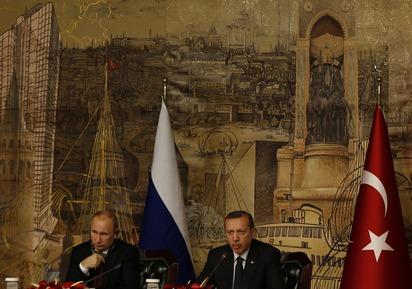
Ο πρόεδρος της Ρωσίας, Βλαντιμίρ Πούτιν, και ο πρωθυπουργός της Τουρκίας, Ταγίπ Ερντογάν, σε συνέντευξη Τύπου στην Κωνσταντινούπολη, στις 3 Δεκεμβρίου 2012. MURAD SEZER / REUTERS
Οι σχέσεις μεταξύ της Τουρκίας [2] και της Ρωσίας [3] είναι επιβαρυμένες από τότε που η τουρκική πολεμική αεροπορία κατέρριψε ένα ρωσικό βομβαρδιστικό [4] που παραβίασε για λίγο τον εναέριο χώρο της, τον Νοέμβριο. Αλλά οι εντάσεις μεταξύ των δύο χωρών κλιμακώνονταν για μήνες πριν από αυτό, πρώτα για την παρέμβαση της Ρωσίας στην Ουκρανία και στην συνέχεια στην Συρία. Ως αποτέλεσμα, στην διάρκεια αυτών των δύο ετών, οι δύο χώρες έχουν αναιρέσει σε μεγάλο βαθμό την συνεννόηση είχαν οικοδομήσει κατά τα προηγούμενα 15.



